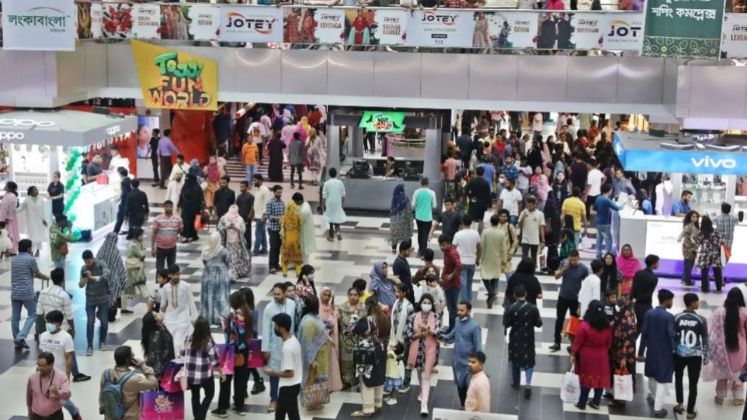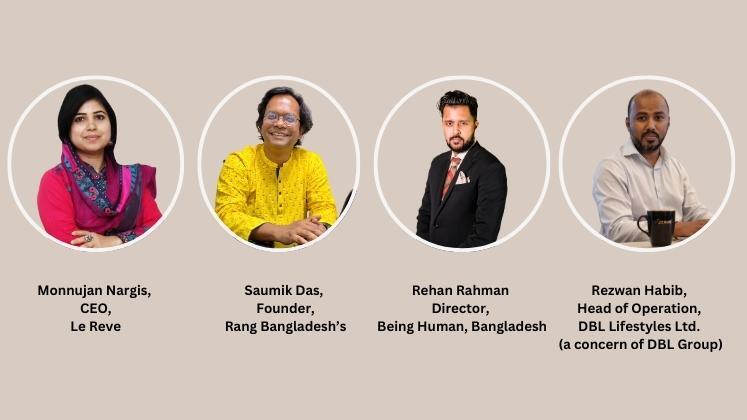Eid-ul-Fitr is the biggest festival in Bangladesh as well as the largest shopping season for the US $ 10.52 billion apparel market of the country. This time, despite severe inflation, fashion companies in Bangladesh enjoyed Eid sales as they matched their expectations. This was thanks to brands’ and retailers’ efforts who were on their toes to attract more customers with increasing thrust on new collections, the addition of new stores during the season and aggressive marketing. Interestingly, this year’s Eid coincided closely with Pohela Boishakh, the Bengali New Year and this led many shoppers to buy apparel for both occasions. A survey conducted by the leading organisation, Bangladesh Shop Owners Association (BSOA), reported that Eid-ul-Fitr generated about US $ 22 million in revenue. The apparel segment got one-third of this which is around Taka 37,400. This has been the maximum spending across various product categories. According to BSOA, Eid multiplied sales several times over with sales at apparel stores (that formerly sold items for Taka 30,000 to 35,000) surpassing Taka 80,000 to 90,000.
In discussion with Apparel Resources, various brands and retailers were unanimously of the view that the festival was highly beneficial for them. Monnujan Nargis, CEO of Le Reve (Reve Group), one of the country’s leading fashion and accessories brands shared, “It was an exciting season for us. We have experienced double-digit growth.”
She also added that though the inflation rate was high, they saw hope even in a tight economic situation in the festive expenditure pattern of people. Monnujan further averred that they experienced a packed shopping floor on weekends and other holidays during that time.
One of the country’s premier fashion brands, Rang Bangladesh, also witnessed good sales. Anjans, one of the leading fashion and lifestyle brands, witnessed the sales of ethnicwear for men increase by 10 per cent. Sara Lifestyle claims to have seen increased sales by 25 per cent especially closer to the festival.
New collections by all
Le Reve curated a special theme called ‘Indulgence’ that emphasises shared happiness within families. They launched over 2000 styles under this theme catering to people of all ages. It also introduced a unique fabric ‘silk-viscose’ that combines the luxury of silk with the comfort needed for summer.
Rang Bangladesh’s Founder Saumik Das informed, “We prepared ourselves well on all the fronts like we introduced several family series, couple and duet clothing pieces.”
Tahoor, a modest womenswear fashion brand, took a huge step by simultaneously launching the same collection for the first time in the Bangladeshi and Dubai markets. The collection attracted interest from customers in both markets. Tahoor has 8 stores in Bangladesh. In the UAE, it is present at a multi-brand designer outlet in Jumeirah called ‘The District Venue’ where Gulf designers showcase their premium line.
It was also observed by the brands and retailers that there was a strong trend of matching dresses amongst family members. Daughters match their dresses with their mothers and the same goes for sons and fathers. Even couples nowadays are inclined to wear matching dresses. In fact, there are instances when all the members of the family desire to wear matching dresses.
Opening of new stores adding to business
Many brands and retailers increased their number of stores a few months before Eid. To mention a few, DBL Group, one of Bangladesh’s biggest conglomerates, launched Levi’s first ever store in the country just before Eid which proved a great success.
Rezwan Habib, Head of Operation (AGM) of the company shared that, “We have worked on the supply chain to make sure that the merchandise is at the store at the correct time. And it paid us well.”
Similarly Being Human Clothing also added new stores and hired an influencer to increase its reach. Being a fast fashion brand, Being Human is known for its shirts, T-shirts, jeans, chinos etc., but during the time of Eid, it witnessed escalating demand for kurta pajamas. Rehan Rahman, representing the Being Human Clothing franchisee in Bangladesh, informed that they are looking to implement kurta pajamas in their future business soon.
Eid sales: not an easy road to traverse
There were several challenges for companies and the most critical of them were the higher cost of raw materials and the overall increased cost of RMG production. Few of the companies increased their price marginally but the majority of them refrained from doing so and had to bear the pressure on their margins.
A few companies also faced supply chain disruptions like Le Reve which shared that launching products on time was a great challenge. The brand overcame this issue by diversifying its product sourcing and including some innovations in product design.
Kumudinir Boson’s Owner, Zarin Rownak, is a well-known entrepreneur having strong social media followers who opined that they could have pulled in more business but due to limited funds,
the brand couldn’t have much inventory.
Increasing focus on tech
As per the e-Commerce Association of Bangladesh (e-Cab), during this year’s Eid-ul Fitr, electronic transactions through banks reached Taka 17 billion which stood at Taka 13.5 billion from 15th March to 10th April last year. And to leverage their e-commerce sales, which is still an issue for most brands and retailers, companies are now focusing on tech adoption. Le Reve will add AI-driven chatbots along with advanced image processing capabilities on its website to provide personalised customer support. Rezwan Habib also shared that engaging with the customers by introducing more technologically advanced tools and ensuring omnichannel experience will be crucial for success in the future. DBL Group is therefore all set to increase its focus on technological adoption.








